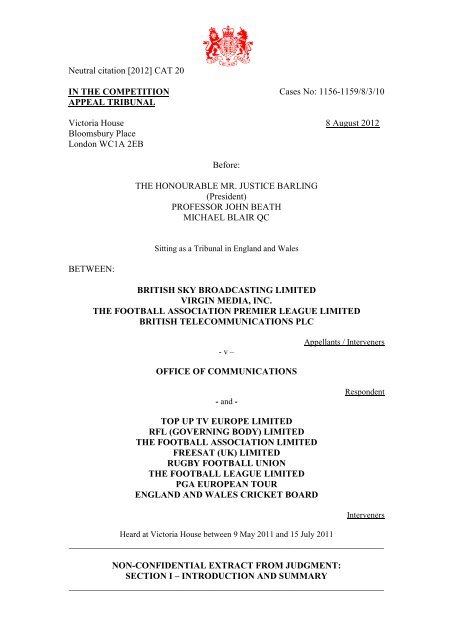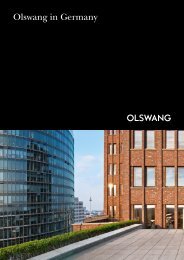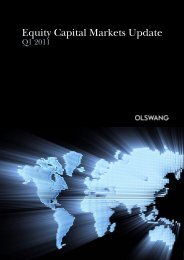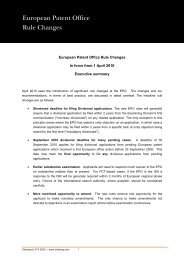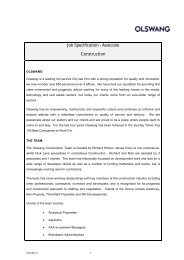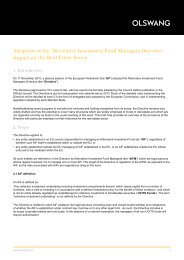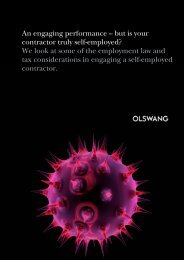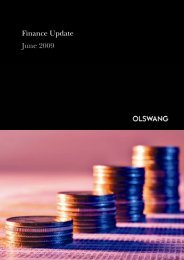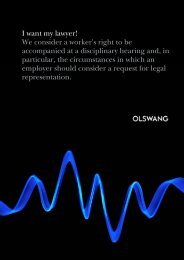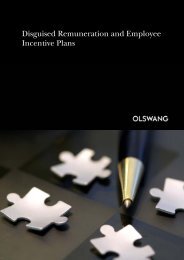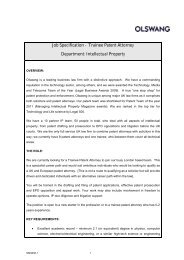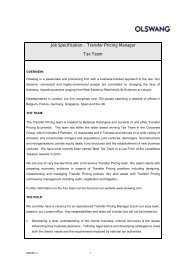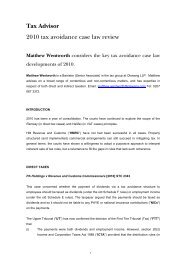PDF 219KB - Competition Appeal Tribunal
PDF 219KB - Competition Appeal Tribunal
PDF 219KB - Competition Appeal Tribunal
Create successful ePaper yourself
Turn your PDF publications into a flip-book with our unique Google optimized e-Paper software.
Neutral citation [2012] CAT 20<br />
IN THE COMPETITION<br />
APPEAL TRIBUNAL<br />
Victoria House<br />
Bloomsbury Place<br />
London WC1A 2EB<br />
Cases No: 1156-1159/8/3/10<br />
8 August 2012<br />
Before:<br />
THE HONOURABLE MR. JUSTICE BARLING<br />
(President)<br />
PROFESSOR JOHN BEATH<br />
MICHAEL BLAIR QC<br />
Sitting as a <strong>Tribunal</strong> in England and Wales<br />
BETWEEN:<br />
BRITISH SKY BROADCASTING LIMITED<br />
VIRGIN MEDIA, INC.<br />
THE FOOTBALL ASSOCIATION PREMIER LEAGUE LIMITED<br />
BRITISH TELECOMMUNICATIONS PLC<br />
- v –<br />
Appellants / Interveners<br />
OFFICE OF COMMUNICATIONS<br />
- and -<br />
Respondent<br />
TOP UP TV EUROPE LIMITED<br />
RFL (GOVERNING BODY) LIMITED<br />
THE FOOTBALL ASSOCIATION LIMITED<br />
FREESAT (UK) LIMITED<br />
RUGBY FOOTBALL UNION<br />
THE FOOTBALL LEAGUE LIMITED<br />
PGA EUROPEAN TOUR<br />
ENGLAND AND WALES CRICKET BOARD<br />
Interveners<br />
Heard at Victoria House between 9 May 2011 and 15 July 2011<br />
_____________________________________________________________________<br />
NON-CONFIDENTIAL EXTRACT FROM JUDGMENT:<br />
SECTION I – INTRODUCTION AND SUMMARY<br />
_____________________________________________________________________
APPEARANCES<br />
Mr Mark Hoskins QC and Mr Gerard Rothschild (instructed by Ashurst LLP)<br />
appeared for Virgin Media, Inc.<br />
Miss Helen Davies QC, Miss Maya Lester and Mr Richard Blakeley (instructed by<br />
DLA Piper UK LLP) appeared for The Football Association Premier League Limited.<br />
Mr James Flynn QC, Mr Meredith Pickford and Mr David Scannell (instructed by<br />
Herbert Smith LLP) appeared for British Sky Broadcasting Limited.<br />
Mr Thomas Plewman SC, Miss Sarah Ford and Miss Sarah Love (instructed by BT<br />
Legal) appeared for British Telecommunications Plc.<br />
Miss Dinah Rose QC, Mr Kieron Beal, Mr Josh Holmes, Miss Jessica Boyd and Mr<br />
Ben Lask (instructed by the Office of Communications) appeared for the Office of<br />
Communications.<br />
Mr Paul Harris QC and Miss Fiona Banks (instructed by the Legal Department, RFL,<br />
the Legal Department RFU, Bird & Bird LLP, Onside Law, Denton Wilde Sapte LLP)<br />
appeared respectively on behalf of RFL (Governing Body) Limited, Rugby Football<br />
Union, The Football Association Limited, PGA European Tour and the Football<br />
League Limited.<br />
Mr Daniel Beard QC (instructed by Milbank, Tweed, Hadley & McCloy LLP)<br />
appeared on behalf of Top Up TV Europe Limited.<br />
Mr Timothy Ward QC (instructed by SJ Berwin LLP) appeared for Freesat (UK)<br />
Limited.<br />
Miss Marie Demetriou (instructed by DLA Piper UK LLP) appeared for the England<br />
& Wales Cricket Board.
I. INTRODUCTION AND SUMMARY<br />
1. Parts of this judgment contain information which has, in the course of these<br />
proceedings, been disclosed only to members of the confidentiality ring established<br />
by the <strong>Tribunal</strong>’s order of 31 March 2011 (as amended from time to time), and<br />
some of which may be confidential. The <strong>Tribunal</strong> will therefore need to determine<br />
which, if any, passages should be excised before publication, having due regard to<br />
the considerations set out in paragraph 1 of Schedule 4 to the Enterprise Act 2002<br />
(“the 2002 Act”), and in the light of any submissions made on behalf of the parties.<br />
In the meantime, in advance of the publication of a non-confidential version of the<br />
full judgment, this Introduction and Summary is being made publicly available so<br />
as to provide an overview of the <strong>Tribunal</strong>’s main conclusions 1 and the outcome of<br />
the appeals themselves. Notwithstanding its prior publication, this section is part of<br />
the judgment and should be read together with the <strong>Tribunal</strong>’s detailed analysis in<br />
the subsequent sections.<br />
The contested decision<br />
2. These appeals arise out of a decision of the Office of Communications (“Ofcom”)<br />
in which Ofcom decided to vary, pursuant to section 316 of the Communications<br />
Act 2003 (“the 2003 Act”), the conditions in the licences granted to British Sky<br />
Broadcasting Limited (“Sky”) under Part I of the Broadcasting Act 1990 (“the 1990<br />
Act”) for certain of Sky’s pay television (“Pay TV”) channels, Sky Sports 1, Sky<br />
Sports 2, Sky Sports 1 HD 2 and Sky Sports 2 HD (the “core premium sports<br />
channels” or “CPSCs”). 3 The new licence conditions (“the Conditions”) require<br />
Sky to offer to wholesale its CPSCs to retailers on other broadcasting platforms<br />
and, in the case of the standard definition (“SD”) versions of the channels, offer<br />
1 It is emphasised that in this section the conclusions are in summary form, and are fully set out only in<br />
the main part of the judgment.<br />
2 HD means “high definition”.<br />
3 In addition to the CPSCs, this judgment refers variously to the “premium channels”, the “core<br />
premium channels”, and to specific channels such as Sky Sports 1. This is to some extent inevitable, as<br />
although the subject-matter of the WMO is the CPSCs, Ofcom refers to evidence gathered in relation to<br />
both premium sports and movie channels, and the subject-matter of the negotiations considered in<br />
section VI below was not always limited to premium sports channels. We have, wherever possible,<br />
attempted to reflect the same language as it was used by Ofcom, or by the parties in their submissions.<br />
1
them at wholesale prices set by Ofcom 4 (“the wholesale must-offer obligation” or<br />
“WMO”). 5 Ofcom’s decision is contained in a document entitled “Pay TV<br />
Statement”, which was published on 31 March 2010 (“the Statement”). 6<br />
3. The Statement is the culmination of a wide-ranging investigation into the Pay TV<br />
sector by Ofcom lasting just over three years. An overview of Ofcom’s<br />
investigation and of the main findings in the Statement is at section II below.<br />
Fundamental to Ofcom’s decision to introduce the Conditions is its finding that Sky<br />
has exploited its market power by restricting wholesale distribution of its premium<br />
channels to potential new retailers in a way which is prejudicial to fair and effective<br />
competition. 7<br />
4. At Annex A to this judgment is a brief description of the Pay TV sector and a<br />
glossary explaining some of the relevant terminology and different technologies,<br />
services and platforms referred to in the main body of the judgment. It may assist<br />
the reader to have these to hand while reading the judgment.<br />
The appeals<br />
5. Each of Sky, The Football Association Premier League Limited (“FAPL”), Virgin<br />
Media, Inc. (“VM”) and British Telecommunications Plc (“BT” and, together with<br />
Sky, FAPL and VM, “the Appellants”) brought appeals 8 challenging the Statement.<br />
The Appellants’ grounds of appeal are summarised very broadly in this section, at<br />
paragraph 12 below, and are described in a little more detail in section III.<br />
4 HD versions of the channels are to be supplied at wholesale prices which are fair, reasonable and free<br />
of undue discrimination.<br />
5 Also on 31 March 2010, Ofcom decided to approve conditionally a request by Sky (together with<br />
Arqiva, the telecommunications company which provides infrastructure and broadcast transmission<br />
facilities in the United Kingdom and Republic of Ireland) to allow it to launch a new service on the<br />
digital terrestrial television platform called “Picnic” (see further para 44 below), and to consult on a<br />
proposed decision to refer to the <strong>Competition</strong> Commission, pursuant to sections 131 to 133 of the 2002<br />
Act, the markets for the sale of premium movie rights and premium movies services. Ofcom ultimately<br />
proceeded to refer these markets to the <strong>Competition</strong> Commission on 4 August 2010.<br />
6 A non-confidential version of the Statement can be viewed at:<br />
http://stakeholders.ofcom.org.uk/binaries/consultations/third_paytv/statement/paytv_statement.pdf<br />
7 Statement, para 1.24.<br />
8 The Appellants’ notices of appeal were filed on 1 June 2010, with the exception of VM, which filed<br />
its notice of appeal on 28 May 2010. All of the Appellants filed amended notices of appeal on 7<br />
September 2010 pursuant to para 7(c) of the <strong>Tribunal</strong>’s order of 25 June 2010.<br />
2
Sky’s application for interim relief<br />
6. Prior to filing its notice of appeal, Sky applied on 16 April 2010 for interim relief<br />
against the Statement pursuant to rule 61 of the <strong>Competition</strong> <strong>Appeal</strong> <strong>Tribunal</strong> Rules<br />
2003 (S.I. No. 1372 of 2003) (“the <strong>Tribunal</strong> Rules”). Following a hearing, and with<br />
the agreement of all the parties then appearing, the President made an interim order<br />
on 29 April 2010 pending final resolution of Sky’s proposed appeal or further order<br />
(“the Interim Relief Order”). The effect of the Interim Relief Order was to vary the<br />
Conditions so as to modify Sky’s obligations under the WMO in respect of the<br />
platform operators specified in the order. Otherwise the operation of the Statement<br />
was suspended generally. In summary, Sky was required to comply with the WMO<br />
as modified, in respect of BT, VM and Top Up TV Europe Ltd (“TUTV”). Those<br />
parties who benefited from the WMO undertook to pay into escrow, pending the<br />
determination of Sky’s appeal, the difference between the price actually paid under<br />
the WMO and the prices contained in Sky’s “rate card” for the same service. 9 The<br />
Interim Relief Order was subsequently amended, on 9 November 2010, following<br />
an application by Real Digital EPG Services Limited to be included within its<br />
scope.<br />
The hearing of the appeals and certain procedural matters<br />
7. At a case management conference on 25 June 2010, 10 each of the Appellants was<br />
granted permission to intervene in the other appeals. RFL (Governing Body) Ltd,<br />
The Football Association Ltd, Rugby Football Union, The Football League Ltd,<br />
PGA European Tour and the England and Wales Cricket Board (together, “the<br />
Sports Body Interveners”), together with TUTV and Freesat (UK) Ltd, were also<br />
granted permission to intervene in the appeals. In view of the inter-relationship<br />
between the four appeals, they were all heard by the <strong>Tribunal</strong> at the same time,<br />
although not formally joined or consolidated. On 25 March 2011, the <strong>Tribunal</strong> also<br />
ordered that the appeals be heard (as regards evidence and documents) with two<br />
other appeals brought by Sky in cases 1170/8/3/10 (“the STB appeal”) and<br />
1179/8/3/11 (“the CAM appeal”). In these appeals Sky contested two decisions by<br />
9 Sky’s “rate card” prices are described in more detail at para 740 ff below.<br />
10 A further case management conference took place on 6 October 2010 and a pre-hearing review took<br />
place on 23 March 2011.<br />
3
Ofcom, made following the Statement, that Sky had breached the Conditions in<br />
respect of its wholesale supply of the CPSCs to TUTV.<br />
8. The main hearing in these proceedings took place over 37 days between 9 May<br />
2011 and 15 July 2011 and was completed within the time allotted. 11 That a<br />
hearing of such logistical complexity, with multiple parties and so many witnesses,<br />
should have started and finished on time is very much due to the hard work and<br />
cooperation of the parties and their representatives, as well as to the <strong>Tribunal</strong>’s<br />
staff. We would like to record our thanks to all involved.<br />
9. The proceedings raised many hundreds of contentious issues between the parties,<br />
and an attempt by Ofcom to itemise them prior to the hearing resulted in a nonexhaustive<br />
schedule that ran to 254 pages. Over 35,000 pages of submissions and<br />
evidence (including nearly 5,000 pages of written pleadings, skeleton arguments<br />
and other submissions) were filed in relation to the four main appeals alone, and the<br />
<strong>Tribunal</strong> received testimony from 41 witnesses (including 14 experts), of whom 25<br />
gave oral evidence before us.<br />
10. In view of this multiplicity of issues and sub-issues, and the related arguments, it<br />
has been neither possible nor necessary (and certainly not desirable) for the<br />
<strong>Tribunal</strong> to refer to, let alone resolve, each and every issue and argument raised. To<br />
have attempted this, even in respect of those grounds of appeal with which we have<br />
found it necessary to deal, would have rendered interminable what is already,<br />
inevitably, a long judgment. Instead we have focussed on what in our view are the<br />
most important issues, together with the main arguments relating to them. 12<br />
11. Given the interrelationship between the grounds of appeal in the four appeals, and<br />
the fact that the appeals were heard together, the <strong>Tribunal</strong> considers it appropriate to<br />
deliver a single judgment.<br />
11 Following the oral hearing a number of additional written submissions were lodged with the<br />
<strong>Tribunal</strong>, the final one being received in December 2011 in connection with the STB and CAM<br />
appeals.<br />
12 The <strong>Tribunal</strong> in this judgment makes extensive use of footnotes, in particular to refer to the<br />
underlying evidence in section VI. However, these footnotes should not be taken to be exhaustive in<br />
their reference to all relevant evidential material.<br />
4
Summary of the grounds of appeal and of the <strong>Tribunal</strong>’s conclusions<br />
12. In very broad terms the Appellants’ main grounds of appeal consisted of:<br />
(a) challenges by both Sky and FAPL to Ofcom’s jurisdiction to take action<br />
under section 316 of the 2003 Act;<br />
(b) a root and branch challenge by Sky to Ofcom’s findings in the Statement as<br />
to the practices on the part of Sky which form the foundations of Ofcom’s<br />
competition concerns, and to which the WMO remedy is directed;<br />
(c) various challenges by all the Appellants to the validity, effectiveness and<br />
proportionality of the WMO remedy imposed by Ofcom.<br />
13. The <strong>Tribunal</strong> has examined the grounds of appeal described at sub-paragraphs (a)<br />
and (b) above. The <strong>Tribunal</strong>’s conclusions on the latter aspect of Sky’s appeal are<br />
sufficient to dispose of the appeals generally, and the <strong>Tribunal</strong> has therefore not<br />
considered it necessary or appropriate to express any conclusion on the grounds<br />
referred to at sub-paragraph (c).<br />
Sky and FAPL’s challenges to Ofcom’s jurisdiction: <strong>Tribunal</strong>’s conclusions<br />
14. The <strong>Tribunal</strong> has concluded that neither of Sky’s and FAPL’s two grounds of<br />
challenge to Ofcom’s jurisdiction to take action under section 316 in the present<br />
case succeeds.<br />
(i)<br />
The “licensed and connected services” argument<br />
15. Both Sky and FAPL submit that Ofcom’s intervention is outside its powers under<br />
section 316 of the 2003 Act on the ground that the intervention is not in respect of<br />
“competition in the provision of licensed services or of connected services”, as the<br />
section requires. Briefly, the main argument is that Ofcom acted with a view to<br />
securing fair and effective competition in service provision at the retail level, i.e. as<br />
between Sky and competing retailers in their provision of the CPSCs to end users;<br />
such retail services are neither licensed services nor services connected with<br />
5
licensed services, and the imposition of the WMO is accordingly outside the scope<br />
of Ofcom’s powers under section 316 of the 2003 Act.<br />
16. The <strong>Tribunal</strong> has concluded that Ofcom’s interpretation of the legislation is to be<br />
preferred, and that “competition in the provision of licensed services” for the<br />
purposes of section 316 includes competition at the retail level and is not confined<br />
to competition occurring at the wholesale level. Therefore, to the extent that<br />
Ofcom’s intervention is aimed at securing that Sky, as the provider of the CPSCs to<br />
other retailers, “does not…engage in any practice which Ofcom consider…to be<br />
prejudicial to fair and effective competition” in the retail provision of CPSCs to end<br />
users, the imposition of the WMO is not outside its jurisdiction under section 316.<br />
17. In the light of the <strong>Tribunal</strong>’s agreement with Ofcom’s primary answer to the<br />
challenge, Ofcom’s alternative contention does not arise, namely that jurisdiction<br />
exists under section 316 to impose the WMO because the retail provision of the<br />
CPSCs is the provision of “connected services” within the meaning of section 316.<br />
(ii)<br />
The competition argument<br />
18. The second limb of Sky’s and FAPL’s challenge to Ofcom’s jurisdiction is that in<br />
identifying the competition concerns in respect of which it has imposed the WMO<br />
remedy in application of section 316, Ofcom has acted in breach of its obligations<br />
under the legislation in question by failing to adhere to an approach based on the<br />
prohibitions in the competition rules laid down by EU law and mirrored in the<br />
<strong>Competition</strong> Act 1998 (“the 1998 Act”). Essentially the argument is that where the<br />
competition concerns identified by Ofcom “traverse the same ground” as the<br />
prohibitions in the ordinary competition rules, Ofcom, in assessing whether a<br />
practice is prejudicial to fair and effective competition for the purposes of section<br />
316, must (with certain qualifications) adopt the same approach as would be applied<br />
under the competition rules and the case law relating to them.<br />
19. The <strong>Tribunal</strong> has concluded that the interpretation of section 316 for which Sky and<br />
FAPL contend is incorrect, and that Ofcom is right in its submission that the section<br />
is not to be construed as confined to circumstances which would otherwise<br />
6
constitute breaches of the competition rules, even with the qualifications<br />
acknowledged by Sky and FAPL. Therefore, in identifying practices which are or<br />
would be prejudicial to fair and effective competition for the purposes of section<br />
316, Ofcom is not required to analyse them specifically by reference to the<br />
principles and case law on, in particular, the prohibition of abuse of a dominant<br />
position (or some approximation thereof), in order to establish jurisdiction to act.<br />
Sky’s challenge to the findings on which Ofcom’s competition concerns are based: the<br />
<strong>Tribunal</strong>’s conclusions<br />
Ofcom’s challenged findings<br />
20. Ofcom’s findings about the existence and nature of the practices on the part of Sky,<br />
which form the foundations of Ofcom’s competition concerns and to which the<br />
WMO remedy is directed, are broadly as follows.<br />
21. Ofcom concluded that Sky, in its dealings with other retailers who sought access to<br />
Sky’s CPSCs, did not engage constructively with their requests and withheld<br />
wholesale supply. Ofcom concluded that Sky, in doing so, was: acting on certain<br />
strategic incentives; choosing to forego the opportunity to earn the revenue that<br />
such deals would have presented; and preferring to be absent from the platforms in<br />
question rather than wholesale to them. Sky’s strategic incentives, as identified by<br />
Ofcom, were (i) to protect its own retail business on the Sky direct-to-home<br />
(“DTH”) satellite platform and (ii) to reduce the risk of stronger competition in the<br />
bidding for content rights.<br />
22. Ofcom maintains that Sky’s acting on strategic incentives is an inference to be<br />
drawn from the empirical evidence of Sky’s “actual behaviour” in the course of the<br />
of the various bilateral negotiations which took place between Sky and certain<br />
retailers or potential retailers of Sky’s CPSCs in the years leading up to the<br />
Statement (“the commercial negotiations”).<br />
23. Ofcom identified other competition concerns relating to Sky’s practices in respect<br />
of VM and its corporate predecessors, ntl and Telewest. These concerns were: the<br />
7
absence of supply of HD versions of Sky’s CPSCs, the absence of supply of certain<br />
interactive services, and the failure to reach agreement on supply of Sky’s premium<br />
channels to an off-net (i.e. not on VM’s cable network) internet protocol TV<br />
(“IPTV”) service then in contemplation. In addition, Ofcom identified another<br />
competition concern in the level of prices charged by Sky for its current wholesale<br />
supply of the CPSCs to VM on the latter’s cable network. Ofcom considered that<br />
these wholesale prices, albeit not a concern of the same magnitude as the absence of<br />
wholesale supply to other retailers, prevented VM from competing effectively<br />
against Sky in the retail supply of the CPSCs.<br />
24. Ofcom’s analysis of the evidence relating to Sky’s conduct and its competition<br />
concerns is set out at Section 7 of the Statement, where in particular the following<br />
main aspects of Sky’s interaction with other retailers, or potential retailers, are<br />
considered:<br />
(a)<br />
Negotiations with TUTV for the proposed supply by Sky of its premium<br />
channels for distribution by TUTV via digital terrestrial television (“DTT”).<br />
(See paragraph 194 ff below.)<br />
(b)<br />
Negotiations with BT for the proposed supply by Sky of its premium<br />
channels for distribution by BT via DTT/IPTV. (See paragraph 260 ff<br />
below.)<br />
(c)<br />
Negotiations with another potential retailer for the supply of Sky’s basic and<br />
premium channels over a proposed IPTV service. (See paragraph 405 ff<br />
below.)<br />
(d)<br />
Negotiations with VM (and its predecessors, ntl and Telewest (together with<br />
VM, “the cable companies”)) both as to the terms of the current wholesale<br />
supply to those companies and for the supply of HD versions of Sky’s<br />
premium channels, the supply of certain interactive services, and the supply<br />
of Sky’s premium channels to a proposed off-net IPTV service. (See<br />
paragraph 497 ff below.)<br />
8
Sky’s challenge to Ofcom’s findings<br />
25. Sky has disputed almost every element of Ofcom’s assessment, not least Ofcom’s<br />
interpretation of the evidence of the commercial negotiations, which is central to<br />
the findings described above.<br />
26. Sky also disputes that in the commercial negotiations it was acting on anything<br />
other than normal commercial incentives, and in particular challenges Ofcom’s<br />
finding that it was acting on the strategic incentives identified in the Statement.<br />
<strong>Tribunal</strong>’s conclusions on Ofcom’s core competition concern<br />
27. The <strong>Tribunal</strong> has examined the evidence in considerable detail. As already<br />
mentioned this evidence includes the contemporaneous documents 13 as well as the<br />
written and oral testimony of witnesses (some of whom were subject to extensive<br />
cross-examination) as to the relevant events and circumstances. The <strong>Tribunal</strong> has<br />
concluded that Ofcom’s core competition concern is unfounded. That concern is<br />
based on the finding to which we have referred, namely that Sky has deliberately<br />
withheld from other retailers wholesale supply of its premium channels, preferring<br />
to be entirely absent from those retailers’ platforms rather than to give them<br />
wholesale access, 14 and that in doing so Sky has been acting on strategic incentives<br />
unrelated to normal commercial considerations of revenue/profit-maximisation.<br />
28. The <strong>Tribunal</strong> is of the view that Ofcom has, to a significant extent, misinterpreted<br />
the evidence of these negotiations, which does not support Ofcom’s conclusion. We<br />
have found a significant number of Ofcom’s pivotal findings of fact in the<br />
Statement to be inconsistent with the evidence.<br />
29. Some of the most important issues on which we have differed from Ofcom relate to<br />
the respective conduct and motivation of Sky and its counterparties in the various<br />
13 These documents relate to the bilateral negotiations between each of the six counterparties referred to<br />
in para 24 above. In the case of some counterparties, there were more than one set of such<br />
negotiations.<br />
14 A finding which Ofcom’s leading counsel described as “the crucial finding of fact” in the Statement:<br />
Transcript 15/20. (Transcript references in the judgment are in the following form: Transcript<br />
[Day]/[Page]:[Line]. However, as here, references are not always made to the specific line of the<br />
transcript.)<br />
9
commercial negotiations for access to the channels. For example, while<br />
acknowledging the existence of some “regulatory gaming” 15 on the part of other<br />
retailers, Ofcom has attributed responsibility for the failure to reach agreement<br />
largely to Sky’s failure to engage constructively with its counterparties. However<br />
the evidence shows that Sky did, on the whole, engage constructively. On the other<br />
hand its counterparties by no means always did so, and in our view regulatory<br />
gaming on the part of some of Sky’s counterparties played a much more important<br />
role in the commercial negotiations and their progress (or lack of it) than Ofcom has<br />
recognised. Although regulatory gaming was not so evident in the case of the<br />
retailer to which we refer at paragraph 24(c) above, Ofcom’s findings as to the<br />
reasons for ultimate abandonment of those negotiations, and its apparent attribution<br />
of significant responsibility to Sky, are again inconsistent with the evidence.<br />
30. Although Sky has a strong preference for having the retail role itself when<br />
supplying its premium channels to third party platforms (known as “self-retail”),<br />
and acts upon that preference in conducting negotiations for access to the channels,<br />
this is not in itself a subject of criticism by Ofcom. Further, leaving aside Sky’s<br />
very long-standing wholesale supply to the cable companies, the evidence put<br />
before us, including evidence arising out of the commercial negotiations, shows<br />
that, contrary to Ofcom’s findings, Sky has no theological objection to wholesale<br />
supply of its premium channels, and is, in principle, willing to do so where selfretail<br />
is not open to it.<br />
31. Another example of an error of factual assessment is Ofcom’s finding that, because<br />
it was unlikely that a competitor would be willing to allow it to self-retail on the<br />
competitor’s platform, it was also unlikely that Sky itself would have had an<br />
expectation that a competitor might allow this. In our view, this finding is<br />
inconsistent with the evidence and wrong in both respects, and has important<br />
implications for Ofcom’s conclusions about Sky’s motivations and in particular the<br />
disputed strategic incentives.<br />
15 This is a reference to the conditioning of a party’s conduct in commercial negotiations by reason of<br />
an ongoing regulatory review by Ofcom, and its hope and expectation that this review would produce a<br />
favourable outcome.<br />
10
<strong>Tribunal</strong>’s conclusions on Ofcom’s concerns relating to the cable companies<br />
32. Ofcom’s other competition concerns, relating specifically to the prices for the<br />
existing wholesale supply of the CPSCs to VM, and the non-supply to the cable<br />
companies of certain new services, are in the <strong>Tribunal</strong>’s view also unfounded.<br />
Further, in that connection we have found no evidence to justify Ofcom’s finding<br />
that Sky has (or has acted upon) an incentive to weaken VM or its corporate<br />
predecessors as competitors.<br />
(i)<br />
Current wholesale prices<br />
33. As for the current terms of supply to VM, and in particular the level of the rate card<br />
prices charged by Sky, in the light of the evidence placed before the <strong>Tribunal</strong> the<br />
price level in question does not obstruct (or contribute to the obstruction of) fair and<br />
effective competition in the retail of these channels by VM. No doubt a lower<br />
wholesale price and a higher margin on packages 16 which contain the Sky channels<br />
in question would be welcomed by VM. However, the small negative incremental<br />
margin which results when one of VM’s subscribers to a package with only basic<br />
Pay TV channels “upgrades” to one which includes CPSCs, is not such as to affect<br />
to any significant extent VM’s incentives to market the latter packages.<br />
34. The evidence makes clear that VM has a strong commercial and financial incentive<br />
to win and retain all customers who are interested in the CPSCs, in competition<br />
with Sky and others. Ofcom found there is no margin squeeze, and on the evidence<br />
we conclude that any cost advantage which Sky enjoys over VM by reason of Sky’s<br />
larger Pay TV subscriber base, is relatively small. Nor does the evidence justify a<br />
finding that the level of the rate card is a significant cause of the persistently lower<br />
CPSC penetration on cable. Other factors, unrelated to rate card levels, are at least<br />
as likely to be at the root of this phenomenon.<br />
35. In our view the evidence overall demonstrates that VM is rightly regarded by Sky<br />
as a serious, well-established rival capable of constraining Sky’s actions in the<br />
16 The CPSCs are not retailed by either Sky or VM as “stand alone” products, but as part of a package.<br />
11
market, and that it does in fact compete effectively with Sky in the retail supply of<br />
packages which include CPSCs. We therefore conclude that Ofcom’s finding as to<br />
the effect of the rate card prices on VM’s incentives and competitive effort is not<br />
justified. Nor indeed is customer choice likely to be adversely affected to any real<br />
extent. Existing customers of VM who wish to take CPSCs can do so without<br />
switching, and at prices which are comparable with those on DTH satellite.<br />
(ii)<br />
HD, interactive and IPTV<br />
36. As for Ofcom’s specific concerns about Sky’s conduct in response to the cable<br />
companies’ requests for supply of HD and interactive services and for supply of<br />
premium channels to a contemplated IPTV platform, the <strong>Tribunal</strong> concludes that<br />
the evidence relating to these issues does not support Ofcom’s central finding that<br />
Sky was unwilling to engage constructively in negotiating the wholesale supply of<br />
the CPSCs. Nor does it justify a finding that Sky’s conduct was motivated by a<br />
desire to weaken the cable companies as competitors. Neither does the <strong>Tribunal</strong><br />
consider that the evidence in question reveals any practice which is itself liable to<br />
prejudice fair and effective competition in the retailing of the CPSCs, or which<br />
would make any significant contribution in combination with other factors.<br />
Strategic incentives<br />
37. Given these conclusions, there is no need for the <strong>Tribunal</strong> to resolve the issues<br />
debated before us at some length as to the plausibility or otherwise as a matter of<br />
economic theory of the alleged strategic incentives on which Sky was said by<br />
Ofcom to be acting in its conduct of the commercial negotiations. Ofcom’s position<br />
at the hearing was that its findings relating to the strategic incentives were not<br />
essential to the existence of its core competition concern, but that the fact of Sky’s<br />
acting upon these incentives would be revealed when we looked at the empirical<br />
evidence of Sky’s conduct. 17 However, having examined that evidence with some<br />
care we have formed a clear view that Sky was acting for ordinary profit/revenuemaximising<br />
commercial motives, and that it cannot reasonably be inferred from the<br />
material put before us that the alleged incentives were conditioning Sky’s conduct.<br />
17 See para 166 below.<br />
12
Ofcom’s exercise of its judgment on certain issues – <strong>Tribunal</strong>’s approach<br />
38. It is to be noted that in relation to two of Ofcom’s specific concerns (supply of<br />
interactive services to VM and the rate card prices paid by VM) the facts made it<br />
appropriate for the <strong>Tribunal</strong> to consider whether Ofcom was right to conclude that<br />
the conduct in question was such as to prejudice fair and effective competition in<br />
the retail supply of the CPSCs. In each of those cases Ofcom’s decision on that<br />
issue was, in our view, wrong. In reaching that conclusion we were mindful that the<br />
question was one on which Ofcom, as the specialist regulator, had been required by<br />
the legislation to exercise a degree of judgment, and that therefore when reviewing<br />
a decision of that kind on appeal we should have regard to certain principles derived<br />
from the authorities, and discussed later in this judgment. 18 In particular we should<br />
give due weight to Ofcom’s decision and its reasoning, and should not interfere<br />
with it unless satisfied that it is wrong.<br />
Consequences of the <strong>Tribunal</strong>’s conclusions<br />
Other appeals and grounds of appeal<br />
39. The <strong>Tribunal</strong>’s conclusions on Sky’s grounds of appeal relating to Ofcom’s<br />
competition concerns are sufficient to dispose of the four appeals, and it is not<br />
necessary for the <strong>Tribunal</strong> to determine Sky’s and the other Appellants’ grounds<br />
challenging the WMO itself, nor for the <strong>Tribunal</strong> to determine the STB and CAM<br />
appeals. 19 Nor do we consider that it would be appropriate for us to do so.<br />
40. It is sometimes appropriate for a court to express its views on issues even though<br />
they have become academic in the light of the court’s findings on other matters.<br />
This can be the case where, as here, the court has heard evidence and submissions<br />
on the issues. The court’s views on them might become relevant or helpful in the<br />
event of an appeal, and/or they might themselves be appealed contingently, against<br />
the possibility of the primary ruling being overturned. However these<br />
considerations did not persuade us in the present case. It would be difficult to<br />
18 See section IV.<br />
19 However, as we note at paras 258-259 of the judgment, the <strong>Tribunal</strong> has considered the documents<br />
and evidence in those appeals.<br />
13
justify the delay in handing down the <strong>Tribunal</strong>’s decision which this exercise would<br />
have entailed, as well as the additional expenditure of judicial and other resources<br />
on issues which, in the light of our primary conclusions, are academic.<br />
41. The decision not to embark on that exercise was to some extent vindicated by<br />
Ofcom’s request to the <strong>Tribunal</strong> on 14 June 2012 not to give judgment yet, but first<br />
to reopen the hearing in order to admit further evidence and allow further<br />
submissions. This request related to issues which are now academic in that they<br />
concern grounds of challenge to the WMO remedy itself. Ofcom’s request 20 arose<br />
out of the latest FAPL auction of live audio-visual rights to its football matches, the<br />
results of which were made public at that time, and which in its view had a bearing<br />
on the arguments put before us. Had we acceded to the request other parties would<br />
certainly have wished to introduce new evidence and submissions themselves. We<br />
declined to reopen the hearing, indicating that our reasons would be contained in<br />
this judgment. Those reasons should now be clear.<br />
Directions and other relief<br />
42. In the light of the <strong>Tribunal</strong>’s conclusions, Sky’s appeal must be allowed, but the<br />
<strong>Tribunal</strong> will hear the parties in due course on the appropriate ruling, in particular<br />
as regards (1) any action that Ofcom should be directed by the <strong>Tribunal</strong> to take for<br />
the purposes of section 195(3) of the 2003 Act 21 (as applied by section 317(7)); (2)<br />
any other order(s) that should be made in respect of the appeals themselves; and (3)<br />
the effect of this judgment on the Interim Relief Order, and generally.<br />
20 This was not the first request to the <strong>Tribunal</strong> to delay its judgment. In May 2012 FAPL asked the<br />
<strong>Tribunal</strong> not to deliver judgment while its 2012 live rights auction was in progress.<br />
21 See para 67 below.<br />
14


